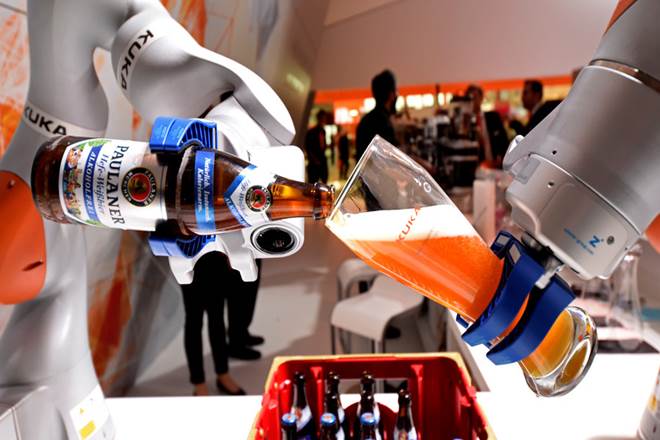The global market for robotic process automation (RPA) software and services is expected to grow to $1.2 billion by 2021 at a compounded annual growth rate of 36%. Symphony Ventures is a global services firm specialising in RPA and intelligent automation. Late last year, the company launched in India, opening its development centre in Bangalore and appointing consulting veteran Ganesh Iyer as CEO for Symphony Ventures India. The firm plans to recruit 150 consulting and technology staff by 2019 to provide consulting, implementation and managed services to enterprise clients within the region. Recently, Iyer spoke to Sudhir Chowdhary about the growth of RPA, its impact and potential in India and job prospects in this niche area.
Excerpts:
RPA has emerged as the latest buzzword alongside automation and AI in the IT services / BPO industry. What exactly is RPA and what impact has it had so far?
Robotic Process Automation (RPA) is any capability (software and services) that allows you to transact in any IT application or website, typically in the same way a human would, to automate complex, rule-based work. In other words, RPA software allows developers to tailor complex automation to a company’s processes. When an RPA robot is at work, it performs tasks just like a human would: logging in, operating applications, entering data, performing complex calculations and logging out. RPA uses technology to mimic work done by human beings and is a subset of automation. From a IT services/BPO perspective, RPA has a role to play for any task that is repetitive, rule-based and does not require subjective judgments to be made. For example, an account opening process, account payables, telecom provisioning, etc., can very easily be handled under RPA.
How do you see its influence panning out in the coming years?
According to HfS Research, the global market for RPA software and services is expected to grow to $1.2 billion by 2021 at a compounded annual growth rate of 36%, from $271 million in 2016. RPA is a subset of digital transformation for any organisation, and can be combined with other new technologies such as IoT, blockchain, AI, analytics and mobility to enhance the ability to enhance customer experience , transform work and deliver bottom-line savings.
What industries are most likely to benefit from RPA? What are the key benefits that accrue on undertaking RPA?
Early adopters of RPA have been banking and financial services, telecom and the healthcare sectors. Over the last three years RPA deployments were geared towards establishing proofs-of-concept – where the more simpler processes were brought under the RPA umbrella and organisations wanted to understand their potential. 2018 will be the ‘Year of the Robot’ where organisations will start to industrialise RPA deployments, and there will be mass-scale adoption and deployment. The benefits of successful RPA are many—cost savings, freeing up staff for work that requires a higher skill-set, improving customer experience, bottom line, etc. RPA also helps firms operate with very few people or when there is a shortage of labour.
Coming to India, how do you see the RPA market developing in the next five years?
The Indian market for RPA is broadly segmented into large IT services organisations which are leveraging RPA to reduce costs of delivery and passing the benefits to their clients; so-called ‘captives’ of global companies that have grown by offering data-centric process management activities and now have to reduce costs to ensure cost structures are optimal; and Indian corporates that are still at the RPA POC (proof-of-concept) stage. While this segment is expected to see large-scale adoption of RPA, how this plays out will be subject to the other societal pressures as a fallout of job losses.
What are the job prospects for Indian talent in the RPA industry?
Digital transformation offers phenomenal opportunities in “new-tech” for Indian professionals. It not only gives them an inroad into an area and array of skills that will see growing demand, it is also an opportunity to upskill as the curriculum at our engineering colleges is still not geared to the demands of the current and future workplace. There will be substantial employment opportunities available in the RPA sector.
Will RPA lead to job redundancies and, if so, how should clients cope with this?
There are two schools of thought. One is that we’ll always create more jobs and that we’ll always be creating new services and products in the market. The other is that it will have a negative effect on employment. So it depends on your perspective. Most of our clients are adopting RPA to back growth. It’s about how they handle more, with the same amount of resources. That has been the main focus, so we haven’t seen any clients that offer less jobs as a result of it so far. This might change as we go forward as we see more clients embrace the technology.
What are Symphony’s plans for India? What are your larger global plans?
In India, Symphony is on track to have 150 consulting and technology staff by the end of 2019 offering consulting, implementation and managed services to enterprise clients within the region. Numerous world-class enterprises have operations in India, the Middle East and the Asia Pacific region. As a result, there is a tremendous opportunity for digital transformation in these markets through the strategic application of RPA.
Globally, we are expected to grow three-fold over 12-18 months in terms of revenue.
How much do RPA projects typically cost? And, what savings do completed projects bring to clients?
A good RPA implementation project delivers ROI within the first twelve months. Costs vary depending on the scale of the project.








